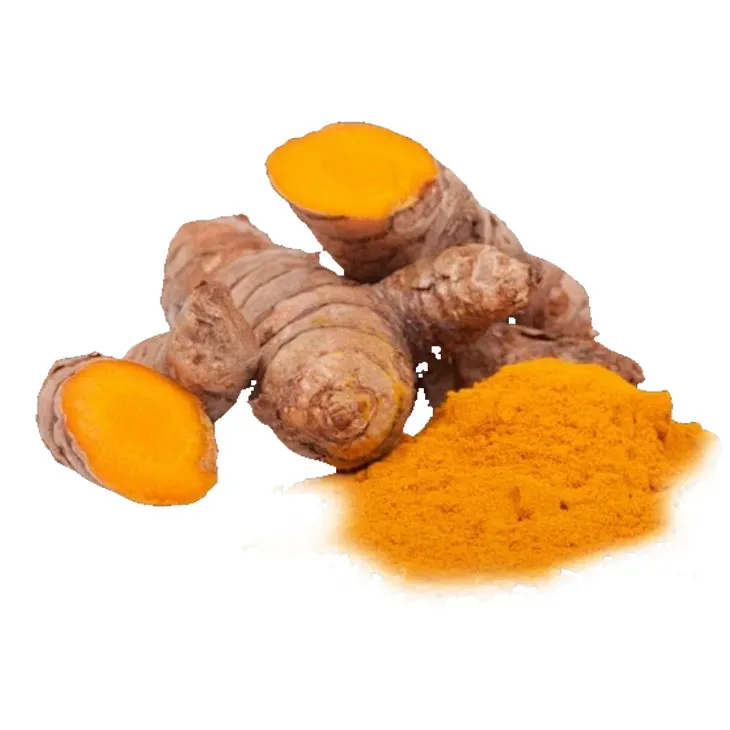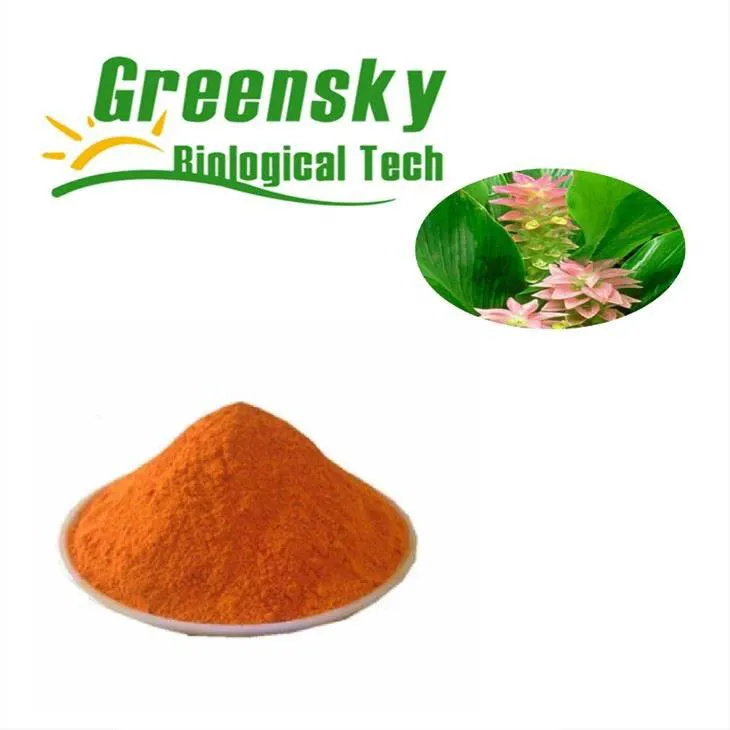- 0086-571-85302990
- sales@greenskybio.com
The Benefits of Curcumin: An Impressive Extract on the Kitchen Table.
2024-11-11

Introduction
Curcumin has been making waves in the world of natural remedies and health - promoting substances. This yellow - colored compound, which is derived from turmeric, a common spice found in most kitchens, has a plethora of benefits that are being increasingly recognized by the scientific community and health - conscious individuals alike. In this article, we will explore the various ways in which Curcumin can be beneficial for our health.

Antibacterial and Antiviral Properties
One of the most significant aspects of Curcumin is its antibacterial and antiviral properties. In a world where infections are a constant threat, having a natural defender in our body can be extremely valuable.
Bacterial Infections
Curcumin has been shown to be effective against a wide range of bacteria. For example, studies have demonstrated its ability to inhibit the growth of pathogenic bacteria such as Escherichia coli and Staphylococcus aureus. This is due to its ability to interfere with the bacteria's cell membranes and internal processes. By disrupting these essential functions, curcumin can prevent the bacteria from multiplying and causing infections in the body.
Viral Infections
Similarly, curcumin also shows promise in the fight against viral infections. It has been studied for its potential to combat viruses like the influenza virus. The compound appears to work by modulating the body's immune response to viral infections. It can enhance the activity of immune cells that are responsible for recognizing and eliminating virus - infected cells. Additionally, curcumin may directly interact with the viral particles, inhibiting their ability to infect healthy cells.

Benefits for Skin Health
Our skin is the largest organ of our body, and curcumin can play an important role in maintaining its health. Thanks to its antioxidant and anti - inflammatory qualities, curcumin has several applications in skin care.
Reducing Skin Aging
As we age, our skin is exposed to various environmental factors such as UV radiation and pollution, which can lead to the production of free radicals. These free radicals can damage the skin cells, leading to premature aging. Curcumin, with its antioxidant properties, can neutralize these free radicals, protecting the skin from oxidative damage. This can result in a reduction in wrinkles, fine lines, and age spots, giving the skin a more youthful appearance.
Treating Skin Disorders
Many skin disorders are characterized by inflammation, such as acne, eczema, and psoriasis. Curcumin's anti - inflammatory properties can be beneficial in alleviating the symptoms of these conditions. It can reduce redness, swelling, and itching associated with inflamed skin. Moreover, curcumin may also have antibacterial effects on the skin, which can be helpful in treating acne, as it can target the bacteria that contribute to the development of acne lesions.

Analgesic Properties for Pain Management
For those seeking natural ways to manage pain, curcumin may offer a viable solution. Its analgesic properties make it a potential non - toxic alternative to traditional pain medications.
How It Works
Curcumin appears to work on multiple levels to relieve pain. It can inhibit the production of inflammatory mediators in the body, which are often responsible for causing pain. For example, it can reduce the levels of prostaglandins, which are involved in the inflammatory response and pain perception. Additionally, curcumin may interact with the nervous system to modulate pain signals. It has been shown to affect the activity of neurotransmitters that are involved in transmitting pain sensations, thereby reducing the overall perception of pain.
Comparisons with Traditional Painkillers
Unlike many traditional painkillers, which can have significant side effects, curcumin is generally well - tolerated. While it may not provide immediate relief as some pharmaceutical drugs do, its long - term use may offer a more sustainable approach to pain management. For chronic pain conditions, such as arthritis, curcumin could potentially be used in combination with other treatments to enhance pain relief and reduce the need for high - dose pain medications.

Other Potential Health Benefits
Beyond its antibacterial, antiviral, skin - health - promoting, and analgesic properties, curcumin may have other benefits for our health.
Cardiovascular Health
There is evidence to suggest that curcumin can have a positive impact on cardiovascular health. It may help to lower cholesterol levels, particularly LDL (bad) cholesterol. By reducing cholesterol levels, curcumin can potentially decrease the risk of developing heart disease. Additionally, it has been shown to have anti - platelet properties, which means it can prevent blood platelets from sticking together and forming clots. This can also contribute to a healthier cardiovascular system.
Brain Health
Curcumin may also play a role in maintaining brain health. It has been studied for its potential to prevent or delay the onset of neurodegenerative diseases such as Alzheimer's and Parkinson's. The antioxidant and anti - inflammatory properties of curcumin can protect brain cells from damage caused by oxidative stress and inflammation. Moreover, curcumin may be able to cross the blood - brain barrier, allowing it to directly interact with brain cells and potentially improve cognitive function.

How to Incorporate Curcumin into Your Diet
Since curcumin is derived from turmeric, one of the easiest ways to get more curcumin in your diet is to use turmeric in your cooking.
Cooking with Turmeric
Turmeric can be added to a variety of dishes, including curries, stir - fries, soups, and smoothies. When cooking with turmeric, it is often beneficial to combine it with black pepper. Black pepper contains a compound called piperine, which can enhance the absorption of curcumin in the body. For example, you can make a delicious and healthy turmeric - spiced chicken curry. Simply marinate chicken pieces in a mixture of turmeric, black pepper, and other spices, then cook it with onions, tomatoes, and your favorite vegetables.
Supplements
If you find it difficult to get enough curcumin through diet alone, you may consider taking curcumin supplements. However, it is important to choose a high - quality supplement. Look for supplements that contain a standardized amount of curcumin and are free from contaminants. It is also advisable to consult a healthcare provider before starting any new supplement regimen, especially if you have any underlying health conditions or are taking medications.
Conclusion
Curcumin, the extract from the common kitchen ingredient turmeric, has a wide range of potential health benefits. From its antibacterial and antiviral properties to its role in skin health, pain management, and other aspects of overall health, it is a compound that is worthy of our attention. Whether through dietary sources or supplements, incorporating curcumin into our daily routine may be a simple yet effective way to promote our well - being. As more research is conducted on this remarkable compound, we can expect to uncover even more of its benefits in the future.
FAQ:
What are the main benefits of curcumin?
Curcumin has several main benefits. It has antibacterial and antiviral properties which can act as a natural defender in the body against infections. Its antioxidant and anti - inflammatory qualities are beneficial for skin health, potentially reducing skin aging and treating skin disorders. Also, it has analgesic properties which can be a non - toxic alternative for pain management.
How does curcumin help in skin health?
Curcumin helps in skin health through its antioxidant and anti - inflammatory qualities. These properties may reduce skin aging as they can combat free radicals and reduce inflammation in the skin. It also has the potential to treat skin disorders by reducing inflammation and providing antioxidant protection.
Can curcumin be used as a pain reliever?
Yes, curcumin can potentially be used as a pain reliever. Due to its analgesic properties, it may offer a non - toxic alternative for those seeking natural ways to manage pain.
Where is curcumin sourced from?
Curcumin is sourced from turmeric, which is a common kitchen ingredient.
Is curcumin effective against infections?
Yes, curcumin may be effective against infections. Its antibacterial and antiviral properties make it a potential natural defender in the body against various infections.
Related literature
- The Therapeutic Potential of Curcumin in Skin Diseases"
- "Curcumin: A Natural Analgesic with Promising Potential"
- "Antibacterial and Antiviral Properties of Curcumin: A Review"
- ▶ Hesperidin
- ▶ citrus bioflavonoids
- ▶ plant extract
- ▶ lycopene
- ▶ Diosmin
- ▶ Grape seed extract
- ▶ Sea buckthorn Juice Powder
- ▶ Beetroot powder
- ▶ Hops Extract
- ▶ Artichoke Extract
- ▶ Reishi mushroom extract
- ▶ Astaxanthin
- ▶ Green Tea Extract
- ▶ Curcumin Extract
- ▶ Horse Chestnut Extract
- ▶ Other Problems
- ▶ Boswellia Serrata Extract
- ▶ Resveratrol Extract
- ▶ Marigold Extract
- ▶ Grape Leaf Extract
- ▶ blog3
-
High purity olive leaf extract
2024-11-11
-
Lavender oil extraction method
2024-11-11
-
100% organic virgin sea buckthorn fruit oil
2024-11-11
-
Lotus leaf extract powder factory in China
2024-11-11
-
China aged garlic extract supplier
2024-11-11
-
Deer antler extract powder manufacturer
2024-11-11
-
Saw palmetto extract vs whole herb
2024-11-11
-
Rosemary extract
2024-11-11
-
Tinospora cordifolia extract
2024-11-11
-
Lily extract
2024-11-11
-
Camu Camu Extract
2024-11-11
-
Kupilu Extract
2024-11-11
-
Eucommia Ulmoides Extract
2024-11-11
-
Mulberry leaf Extract
2024-11-11
-
Hawthorn powder
2024-11-11
-
Hawthorn Extract
2024-11-11
-
Shikone Extract
2024-11-11





















